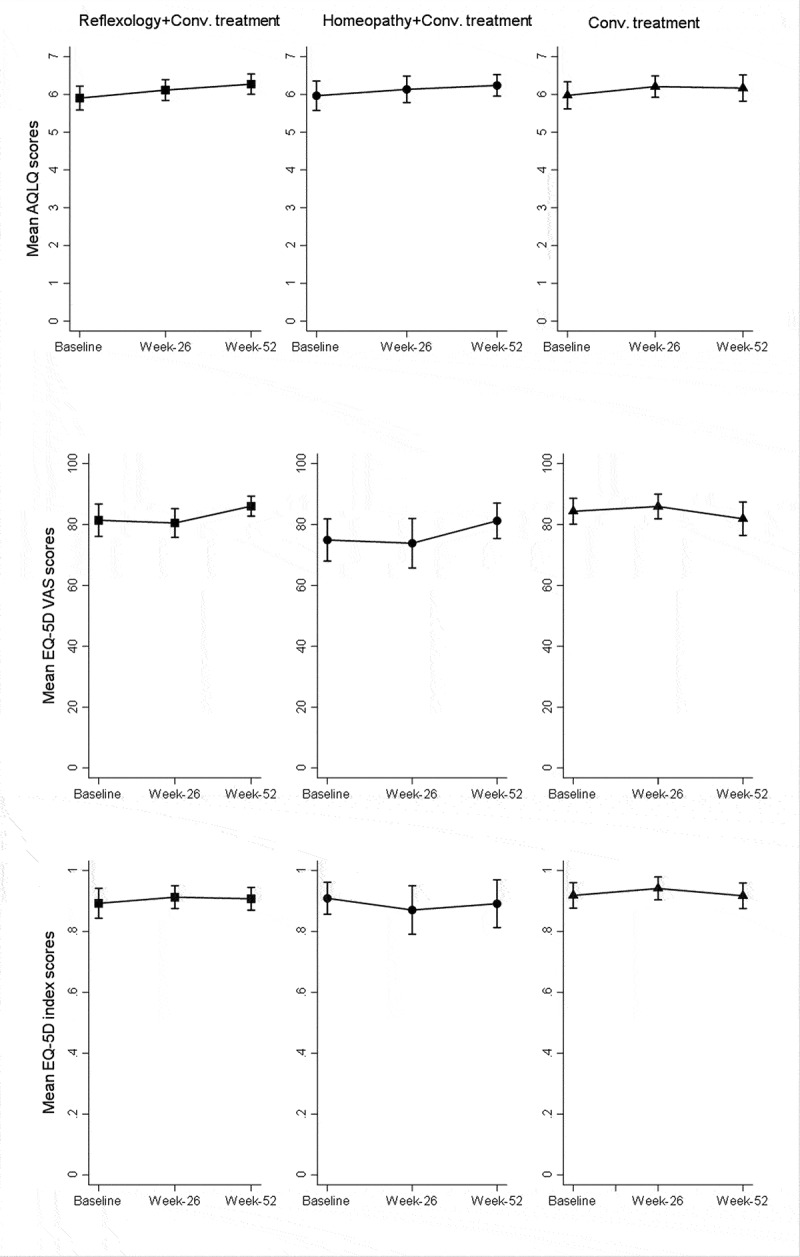The aim of this study was to evaluate the effect of reflexology and homeopathy as adjunctive therapies in asthma. In a single centre, randomised, investigator blinded, controlled study, 86 asthma patients were enrolled. They were assigned to one of three study groups:
- conventional treatment alone,
- conventional treatment with homeopathy
- conventional treatment with reflexology
All patients received their asthma treatment during the study and were followed as usual by their general practitioner. The clinical assessors were blinded to group allocations. The primary outcome was the change in the asthma quality of life questionnaire (AQLQ) scores after 26 weeks. Secondary outcomes included asthma control questionnaire, EuroQol, forced expiratory volume in 1 sec, morning and evening peak expiratory flow, asthma symptoms, rescue medication use, and total medication score.
Minor improvements in the AQLQ score were observed in all three groups. However, no statistically significant changes in AQLQ scores were seen within or between groups. Likewise, secondary outcomes did not differ between groups.
The authors concluded that, in this study, the addition of homeopathy or reflexology to conventional treatment did not result in improved quality of life in asthma.
This study has several flaws. For instance, its sample size is too small to allow firm conclusions and it follows the ‘A+B versus B’ design. Therefore, we need to ask whether the findings are perhaps not reliable. The best answer to this question might be found by looking up the current Cochrane review. It concludes that there is not enough evidence to reliably assess the possible role of homeopathy in asthma. In other (and clearer) words, there is no good reason to assume that homeopathy is effective for asthma; in the present study, it did not even convey a placebo effect. This, I think, suggests that the conclusion of this new trial might be correct:
HOMEOPATHY DOES NOTHING FOR ASTHMA PATIENTS.


Well, according to these graphs, patients using ONLY conventional medical treatment decreased in their benefits between weeks 26-52, while those people who underwent conventional medical treatment AND reflexology OR homeopathy IMPROVED slightly between weeks 26-52.
Thanx for verifying the very opposite of what you claim this evidence showed.
graphs are no replacement for stats, Dana – see, you might have learned something today!
[no need to thank me]
Dana,
That isn’t what those graphs show. If you hold a straight edge (such as a piece of folded paper) against them it is clear that you can draw a straight line within the error bars sloping either way for every single one of them. This clearly shows that any changes in the values plotted are well within what would be expected by chance if none of the interventions made any difference. This is a visual representation of the statement “no statistically significant changes in AQLQ scores were seen within or between groups”.
Furthermore, if you choose to focus on just one part of the graph that increases the probability that your findings are simply due to random fluctuations.
Reading graphs such as these isn’t difficult, but it does require an elementary knowledge of statistics. By that, I don’t mean that you need to understand any advanced maths. Most of the mistakes that people make when it comes to statistics are because they are measuring the wrong thing. In this case the problem seems to be that you are trying to find patterns in random numbers. Our instinct for the behaviour of random numbers is very misleading and without at least some training nearly everybody gets it wrong. However, if you are going to base any sort of decision on the outcome of a medical trial you have a responsibility to ensure that you know how to interpret the results.
“However, if you are going to base any sort of decision on the outcome of a medical trial you have a responsibility to ensure that you know how to interpret the results.”
Humpty Dumpty knows how to interpret the results.
No, Dana.
THE AUTHORS
Oh and thank you for confirming once again your utter ignorance of statistics. Something which is, I suppose, essential if you want to continue in your ongoing exercise in self-delusion as to the theraputic effectiveness of magic shaken water.
Perhaps instead of uselessly grandstanding here, Dana should write directly to the authors explaining to them, in scientific terms, exactly why their own stated conclusion is wrong?
If he’s got enough time to fawn over the awful Peter Doshi he’s certainly got enough time to do some science. Or does Dana only care about being seen in public, like a wart?